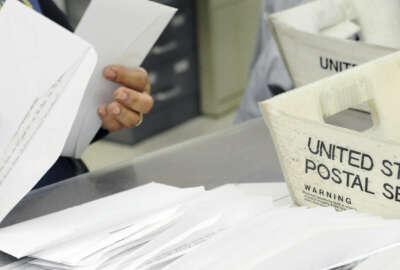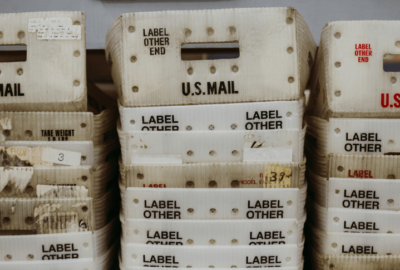

Hubbard Radio Washington DC, LLC. All rights reserved. This website is not intended for users located within the European Economic Area.
A bipartisan coalition in the House is putting pressure on the Senate and White House to approve emergency funding for the Postal Service before it runs out of ...
With the Postal Service reeling from the financial impact of the coronavirus pandemic, the Trump administration last week set an ultimatum for the agency to hike its package and shipping prices before it receives a $10 billion loan guaranteed under the Coronavirus Aid, Relief, and Economic Security (CARES Act).
Looking to overcome this impasse, a bipartisan coalition in the House is putting pressure on the Senate and White House to approve emergency funding for the Postal Service before it runs out of cash in the coming months.
House Oversight and Reform Committee Chairwoman Carolyn Maloney (D-N.Y.) and Government Operations Subcommittee Chairman Gerry Connolly (D-Va.) joined Rep. Peter King (R-N.Y.), ranking member of the House Homeland Security Committee’s subcommittee on emergency preparedness, and Rep. Mark Amodei (R-Nev.) to stand up a Postal Preservation Caucus.
The caucus on Thursday sent a letter to House and Senate leadership urging Congress to expedite a request from the USPS Board of Governors for $50 billion in emergency funding — half appropriations, half funding for “shovel ready” facility modernization projects — and another $25 billion in borrowing authority from the Treasury Department.
“The Postal Service is an indispensable component of America’s critical infrastructure, and its workers are on the frontlines every single day delivering information and packages to the American people,” caucus members wrote. “We must save it now. We urge you to work in the coming days to pass legislation that will give the Postal Service the assistance it needs to keep functioning on behalf of the American people.”
The creation of the Postal Preservation Caucus comes days after a bipartisan majority of the New York State delegation urged House and Senate leadership to include financial relief of the Postal Service in the next round of coronavirus spending.
In a call with reporters Thursday, Connolly said several Republican senators were “receptive” to a version of the CARES Act that would’ve given the Postal Service cash relief, but the White House insisted on changing that language to a $10 billion loan.
Since then, Connolly said Treasury Secretary Steven Mnuchin has tried to use that loan as a “Trojan horse” to have a greater say over the Postal Service’s business operations.
“He is insisting on conditionality that would wholesale transfer management responsibilities and pricing decisions — which by law are made by the Postal Regulatory Commission, not by the Secretary of Treasury — if they want to have access to that line of credit. From my point of view, that’s a non-starter,” he said.
Mnuchin, in a White House press conference last week, said Treasury was “going to put certain criteria for a postal reform program as part of the loan.”
However, King said Congress should instead focus on the immediate challenge of keeping the Postal Service from running out of cash before the end of the fiscal year.
“People have agendas, they want to dramatically change the post office, that’s all for another day. You can’t be doing that during the midst of a pandemic, using this as an excuse to basically destroy the post office or weaken it so much that it has changed beyond recognition. Right now, they’re in this crisis because of the pandemic,” he said.
As for what might change in future rounds of negotiation with the Senate and the White House, King said that whipping up support for emergency postal funding might come down to leveraging public support for the agency.
“I don’t expect this to be easy, I don’t expect to change Mitch McConnell’s mind as to what he wants to do, but you can put them in a position where they have to go along with this. This, to me, is part of hard bargaining and we have to fight to get it done,” King said.
Connolly said public awareness of the Postal Service’s dire financial situation has increased significantly since the passage of the CARES Act.
“In the last three weeks in my office, given everything we’re dealing with, we’re getting thousands of communications every week. The number-one issue for the last three weeks, believe it or not, has been postal. People, when they learn that postal could be at risk, they are very agitated and outraged about that,” Conolly said.
“Viral tweets,” he added, have raised awareness of the issue.
Tweets of support for the Postal Service in the past month have come from such a wide range of voices as actor Ryan Reynolds, Sen. Tom Carper (D-Del.) and the fast-food chain Wendy’s
Hey, @USPS and everyone working there, thanks for all you do.
— Ryan Reynolds (@VancityReynolds) April 14, 2020
.@USPS workers risk their health and their families health to make sure homes and businesses receive critical packages and hospitals and health care workers receive #COVID19 tests and personal protective equipment.
Today and every day, I am grateful for their service. pic.twitter.com/SeeeeVPYcV
— Senator Tom Carper (@SenatorCarper) April 27, 2020
We never fail to get our mail, and that is thanks to all of the amazing letter carriers coming through for all of us. Thank you. ❤️
— Wendy’s (@Wendys) April 20, 2020
The Postal Service remains the most popular federal agency in the public opinion. In a Pew Research Center poll of more than 1,000 adults last month, more than 91% of respondents said they have a favorable opinion of USPS — a rating higher than the Centers for Disease Control and Prevention or the Census Bureau.
In a recent poll of more than 800 registered voters, 92% of respondents in a Hart Research Associates and North Star Opinion Research supported congressional appropriations for the Postal Service in the next round of emergency pandemic spending. That study was commissioned by the National Association of Letter Carriers.
Meanwhile, more than 49% of respondents in a poll conducted by data analytics firm YouGov on behalf of the American Postal Workers Union said they would be less likely to vote for an incumbent senator or representative who doesn’t vote for emergency USPS funding.
Connolly said he expects bipartisan support for keeping the Postal Service from running out of cash, especially from members who represent rural districts.
“If I’m a Republican member of Congress from a rural part of America, I understand that if there’s any cutback on the Postal Service, it will affect my region first. We’re the more remote, we’re the more expensive and we’re [at] risk. So I think there’s got to be a bipartisan effort, I think it will be,” he said.
Maloney said that USPS, with its universal service obligation to deliver mail to every address in the country six days a week, has a distribution network that no private entity would replace.
“If you’re the only person in a county, you’re going to get your mail. And even if there are only 30 people in the county, you’re going to get your mail. That wouldn’t be there in a privatized system,” she said.
By the president’s own admission, the Postal Service delivers mail and packages to areas of the country where private shippers don’t do business. However, he argued in a press conference this month that the agency doesn’t charge companies enough money for what the industry calls “last-mile delivery.”
“These great, wonderful, modern companies, they walk into our old Post Office with all these routes that could never be built; you could never build them. They go into areas that you could never do, and they say, ‘Here. Deliver this.’ And they lose a lot of money per package,” Trump said.
By law, the Postal Service must demonstrate that its package business at least covers its costs, and the Postal Regulatory Commission reviews the negotiated service agreements between USPS and businesses to ensure that the agency receives a fair rate.
While the Postal Service has seen steady growth in its package and shipping business in recent years, packages only make up about 30% of the agency’s total revenue.
Meanwhile, the Postal Service during the pandemic has seen its revenue drop by at least 30% compared to last year, and expects to see a $13 billion revenue loss by the end of the fiscal year.
Postmaster General Megan Brennan recently warned members of the House Oversight Reform Committee that “the sudden drop in mail volumes, our most profitable revenue stream, is steep and may never fully recover.”
Over the next ten years, the Postal Service estimates that losses caused by the coronavirus would reach $54 billion.
However, Postal Service’s financial woes began long before revenue declines from the pandemic. The agency has ended the past 13 years with net financial losses.
A 2006 mandate to pre-fund retiree health benefits for postal retirees accounts for a significant portion of its losses. The Government Accountability Office estimates USPS has defaulted on more than $48 billion in payments to that fund, which will run out of money by 2030.
The House passed a bill in February that would repeal this pre-funding mandate, the White House postal task force recommended keeping that mandate in place.
However, GAO finds that USPS’ total unfunded liabilities and debt — about $143 billion in 2018 — have grown to double the agency’s annual revenue.
Copyright © 2024 Federal News Network. All rights reserved. This website is not intended for users located within the European Economic Area.
Jory Heckman is a reporter at Federal News Network covering U.S. Postal Service, IRS, big data and technology issues.
Follow @jheckmanWFED



